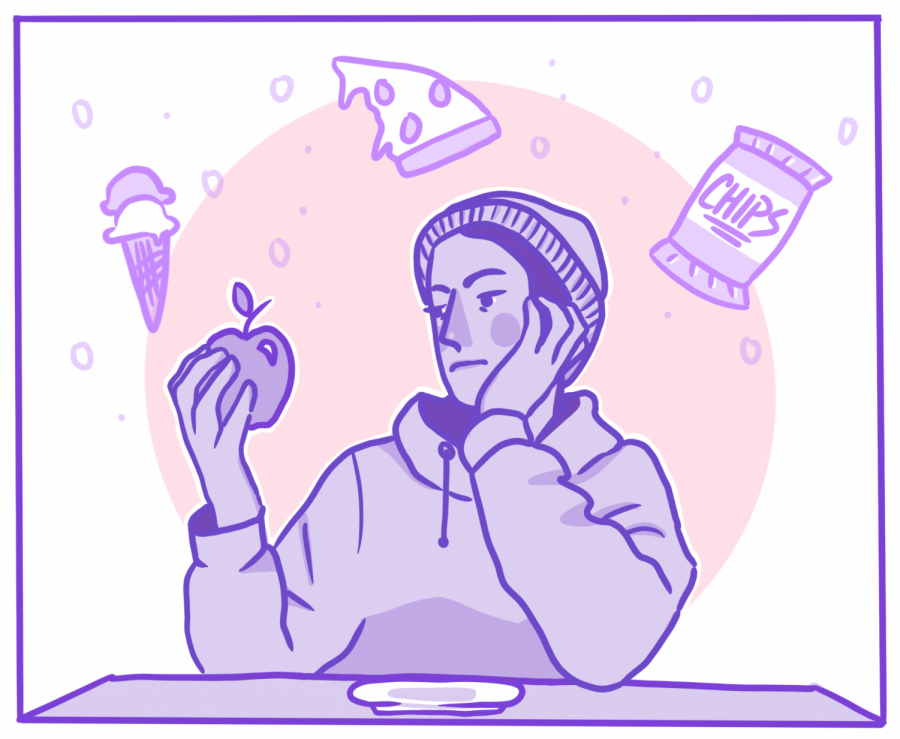Parents shouldn’t restrict their kids’ eating
May 10, 2021
Growing up, food was always an interesting — and stressful — topic of conversation in my house.
My parents — whose own families handled food in very different ways — restricted eating as a way to prioritize health, but they didn’t realize that the actions they took early on had long-lasting effects.
I didn’t touch soda until I was 11. I knew what high fructose corn syrup was at the age of six. Having a bag of potato chips in my house was an anomaly until I was 16.
I rarely saw my dad eat something other than salad for most of my childhood.
When I was younger, family meals typically consisted of reluctance to eat, guilt when I didn’t want to eat vegetables and overall frustration with my parents.
Was there something wrong with me for wanting sugary cereal and pizza? Eight-year-old me didn’t understand why my friends got to eat fun snacks while I would just be lectured about all the crap I was putting into my body.
I learned fairly quickly to stop asking my parents to buy apple juice and Oreos at the grocery store; I’d just feel guilty and sad.
The effects of food restriction can be very damaging to children and persist throughout adolescence and later life.
My lunch in high school usually consisted of half a sandwich and ten carrots or an apple. At the time that seemed sufficient, but looking back that was a pathetic excuse for a meal.
The interesting thing is, my parents didn’t pack my lunch, I did. The habits and fears they instilled in me in elementary school about so many foods being “bad” and “unhealthy” were reflected in how I ate years later.
Food restriction is defined as when “a parent or caregiver tightly controls or eliminates palatable foods like sweets and treats,” according to Jill Castle’s, a childhood nutritionist, website from January 2021.
One of the effects of heavily restricting what kids eat is the feeling of being left out. Heavy restriction can include limiting the portions of kids’ food, labeling certain foods as “bad” or “unhealthy,” and creating shame around food, said Jill Castle in the same article.
This can often cause kids to try and sneak food, developing an unhealthy dynamic between parents and kids which can create fear or animosity towards parents. This dynamic also increases feelings of guilt and shame among kids, also said by Jill Castle.
Similarly, for some kids, parents heavily restricting what they eat can develop into disordered eating which is a pattern of irregular eating habits, according to the National Eating Disorder Association.
Food restriction coupled with dialogue around diet culture can become a toxic environment for kids and can evolve into an eating disorder for some kids, according to a 2017 Today article.
Untreated eating disorders can have many consequences to the cardiovascular, gastrointestinal and endocrine systems in addition to neurological problems according to the National Eating Disorder Association.
Parents who adopt food restricting behaviors most likely do so in order to encourage their kids to eat healthier foods.
However, banning certain foods tends to make kids pickier, according to a 2020 study conducted by the American Academy of Pediatrics.
The study followed over 300 pairs of parents and children for five years. Parents who imposed fewer or little food restrictions often had kids who were significantly less picky while those who restricted food resulted in pickier eaters.
One reason for this could be because kids who grew up with heavy food restriction have negative memories and thoughts associated with food said Nancy Zucker, an associate professor of psychiatry at Duke University.
My attitude around food is different now. Through family discussion, some of my own research on eating habits and a little help from my therapist, I continue to change my mindset on how I view and talk about food.
I can recognize when I need to eat more and understand that everything is okay in moderation, but even as a 19-year-old adult, I still think about the way food was discussed when I was little.
I will still rarely drink something other than water in the Grundle and certainly have felt guilty after eating a cheeseburger for dinner.
Taking back the power food holds over me is an exhausting and long process, but one day I will happily drink a bottle of Sprite and munch on a box of cookies without feeling any guilt or shame and it’s gonna taste so damn good.








